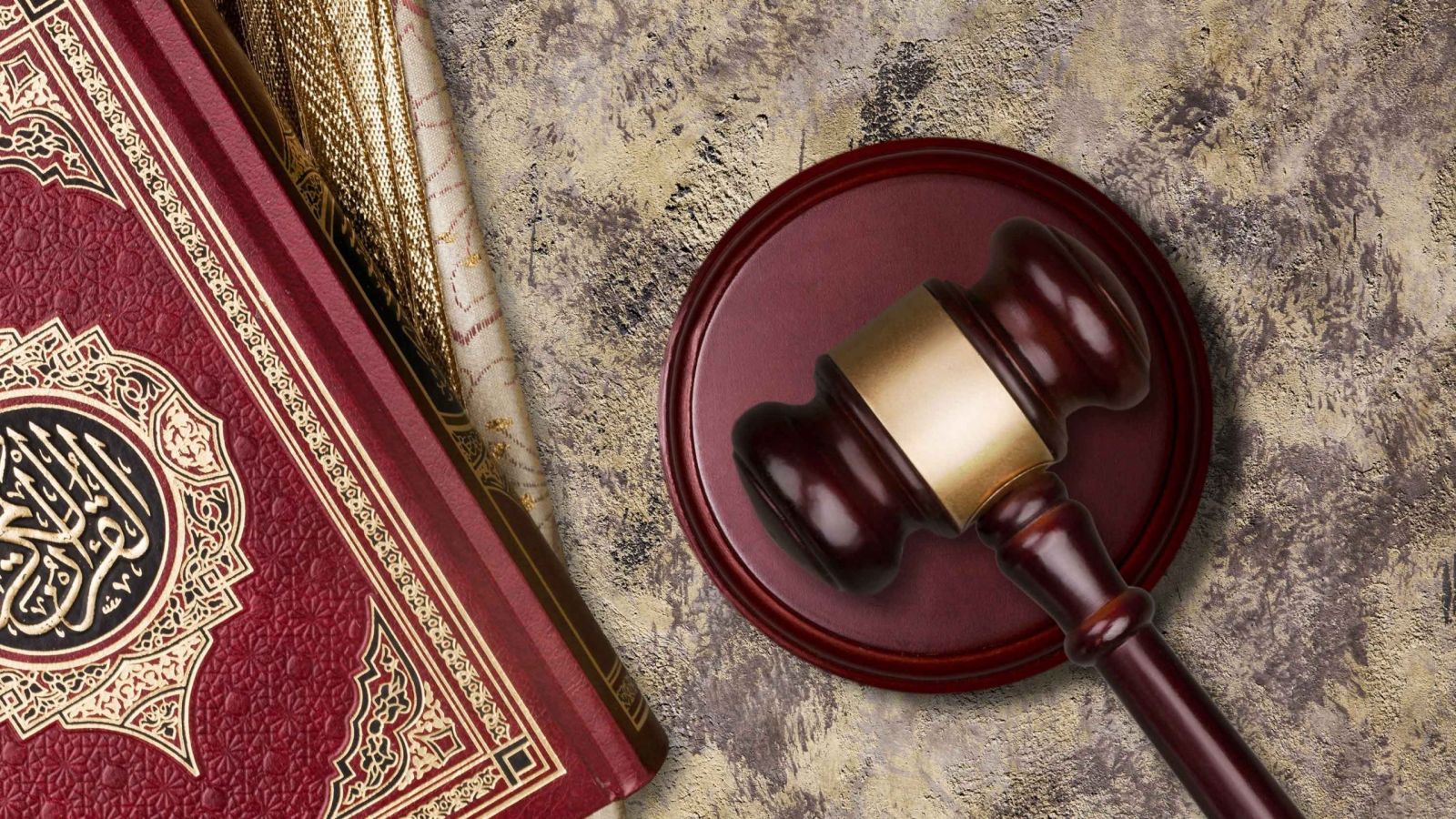Divine Acquittal
Shaykh Mūsá Richardson

Narrated ʿAʾīshah (raḍī Allāhu ʿanhā):
Whenever Allāh’s Apostle intended to go on a journey, he used to draw lots amongst his wives, and Allāh’s Apostle used to take with him the one on whom the lot fell. He drew lots amongst us during one of the Ghazwat which he fought. The lot fell on me and so I proceeded with Allāh’s Apostle after Allāh’s order of veiling (the women) had been revealed. I was carried (on the back of a camel) in my howdaj and carried down while still in it (when we came to a halt). So we went on until Allāh’s Apostle had finished from that Ghazwa of his and had returned. When we approached the city of Madīnah he announced at night that it was time for departure. So when they announced the news of departure, I got up and went away from the army camps, and after finishing from the call of nature, I came back to my riding animal. I touched my chest to find that my necklace which was made of Zifar beads (i.e. Yemenite beads partly black and partly white) was missing. So I returned to look for my necklace and my search for it detained me. (In the meanwhile) the people who used to carry me on my camel came and took my howdaj and put it on the back of my camel on which I used to ride, as they thought that I was in it.
In those days women were light for they did not get fat, and flesh did not cover their bodies in abundance as they used to eat only a little food. Those people, therefore, disregarded the lightness of the howdaj while lifting and carrying it, and at that time I was still a young girl. They made the camel rise and all of them left (along with it). I found my necklace after the army had gone. Then I came to their camping place to find no call maker, nor one who would respond to the call. So I intended to go to the place where I used to stay, thinking that they would miss me and come back for me. While I was sitting in my resting place, I was overwhelmed by sleep and slept. Safwān ibn al-Muʾaṭṭal al-Sulami al-Dhakwāni was behind the army. When he reached my place in the morning, he saw the figure of a sleeping person and he recognized me as he had seen me before the order of compulsory veiling (was prescribed). So I woke up when he recited Istirjāʾ (i.e. “Innā lillāhī wa innā ilayhi rājiʿūn”) as soon as he recognized me. I veiled my face with my head cover at once, and by Allāh, we did not speak a single word, and I did not hear him saying any word besides his Istirjāʾ.
He dismounted from his camel and made it kneel down, putting his leg on its front legs and then I got up and rode on it. Then he set out leading the camel that was carrying me till we overtook the army in the extreme heat of midday while they were at a halt (taking a rest). (Because of the event) some people brought destruction upon themselves and the one who spread the ifk (i.e. slander) more, was ʿAbdullāh ibn ʿUbayy ibn Sālūl.’ (ʿUrwa said, “The people propagated the slander and talked about it in his (i.e. ʿAbdullāh’s) presence and he confirmed it and listened to it and asked about it to let it prevail.” ʿUrwa also added, “None was mentioned as members of the slanderous group besides (ʿAbdullāh) except Ḥassan ibn Thābit, Misṭah ibn Uthāthah and Hamna bint Jahsh, along with others about whom I have no knowledge, but they were a group as Allāh said. It is said that the one who carried most of the slander was ʿAbdullāh ibn ʿUbayy ibn Salūl.” ʿUrwa added, “ʿĀʾīshah disliked to have Ḥassan abused in her presence and she used to say, ‘It was he who said: My father and his (i.e. my father’s) father and my honour are all for the protection of Muḥammad’s honour from you).'” ʿĀʾīshah added, “After we returned to Madīna, I became ill for a month.”
The people were propagating the forged statements of the slanderers while I was unaware of all that, but I felt that in my present ailment, I was not receiving the same kindness from Allāh’s Apostle as I used to receive when I got sick. (But now) Allāh’s Apostle would only come, greet me and say,’How is that (lady)?’ and leave. That roused my doubts, but I did not discover the evil (i.e. slander) till I went out after my convalescence. I went out with Umm Misṭah to al-Manasi where we used to answer the call of nature and we used not to go out (to answer the call of nature) except at night, and that was before we had latrines near our houses. And this habit of ours concerning evacuating the bowels was similar to the habits of the old Arabs living in the deserts, for it would be troublesome for us to have latrines near our houses. So I and Umm Misṭah who was the daughter of Abū Ruhm ibn al-Muṭṭalib ibn ʿAbd Manāf, whose mother was the daughter of Sakhr ibn ʾAmir and the aunt of Abū Bakr al-Ṣiddīq and whose son was Misṭah ibn Uthāthah ibn ʿAbbās ibn al-Muṭṭalib, went out. I and Umm Misṭah returned to my house after we finished answering the call of nature. Umm Misṭah stumbled by getting her foot entangled in her covering sheet and on that she said, ‘Let Misṭah be ruined!’ I said, ‘What a hard word you have said. Do you abuse a man who took part in the battle of Badr?’ On that, she said, ‘O you Hantah! Didn’t you hear what he (i.e. Misṭah) said? ‘I said, ‘What did he say?’ Then she told me the slander of the people of ifk.
So my ailment was aggravated, and when I reached my home, Allāh’s Apostle came to me, and after greeting me, said, ‘How is that (lady)?’ I said, ‘Will you allow me to go to my parents?’ as I wanted to be sure about the news through them. Allāh’s Apostle allowed me (and I went to my parents) and asked my mother, ‘O mother! What are the people talking about?’ She said, ‘O my daughter! Don’t worry, for scarcely is there a charming woman who is loved by her husband and whose husband has other wives besides her that they (i.e. women) would find faults with her.’ I said, ‘Subḥān-Allāh! Are the people really talking in this way?’ I kept on weeping that night till dawn. I could neither stop weeping nor could I sleep. Then in the morning again, I kept on weeping. When the Divine Inspiration was delayed. Allāh’s Apostle called ʿAlī ibn Abī Ṭālib and Usāma ibn Zaid to consult them about divorcing me. Usāma ibn Zaid said what he knew of my innocence, and the respect he preserved in himself for me. Usāma said, ‘(O Allāh’s Apostle!) She is your wife and we do not know anything except good about her.’ ʿAlī ibn Abī Ṭālib said, ‘O Allāh’s Apostle! Allāh does not put you in difficulty and there are plenty of women other than she, yet, ask the maid-servant who will tell you the truth.’ On that Allāh’s Apostle called Barīra (i.e. the maid-servant) and said, ‘O Barīra! Did you ever see anything which aroused your suspicion?’ Barīra said to him, ‘By Him Who has sent you with the Truth. I have never seen anything in her (i.e. ʿĀʾīshah) which I would conceal, except that she is a young girl who sleeps leaving the dough of her family exposed so that the domestic goats come and eat it.’
So, on that day, Allāh’s Apostle got up on the pulpit and complained about ʿAbdullāh ibn ʿUbayy (ibn Salūl) before his companions, saying, ‘O you Muslims! Who will relieve me from that man who has hurt me with his evil statement about my family? By Allāh, I know nothing except good about my family and they have blamed a man about whom I know nothing except good and he used never to enter my home except with me.’ Saʿd ibn Muʿādh the brother of Banu ʿAbd al-Ashhal got up and said, ‘O Allāh’s Apostle! I will relieve you from him; if he is from the tribe of al-Aus, then I will chop his head off, and if he is from our brothers, i.e. al-Khazraj, then order us, and we will fulfill your order.’ On that, a man from al-Khazraj got up. Umm Ḥassan, his cousin, was from his branch tribe, and he was Saʿd ibn ʿUbādah, chief of al-Khazraj. Before this incident, he was a pious man, but his love for his tribe goaded him into saying to Saʿd (ibn Muʿādh): ‘By Allāh, you have told a lie; you shall not and cannot kill him. If he belonged to your people, you would not wish him to be killed.’ On that, Usayd ibn Hudayr who was the cousin of Saʿd (ibn Muʿādh) got up and said to Saʿd ibn ʿUbādah, ‘By Allāh! You are a liar! We will surely kill him, and you are a hypocrite arguing on behalf of hypocrites.’ On this, the two tribes, al-Aus and al-Khazraj, got so excited that they were about to fight while Allāh’s Apostle was standing on the pulpit. Allāh’s Apostle kept on quietening them till they became silent and so did he.
All that day I kept on weeping with my tears never ceasing, and I could not sleep. In the morning my parents were with me and I wept for two nights and a day with my tears never ceasing and I could not sleep till I thought that my liver would burst from weeping. So, while my parents were sitting with me and I was weeping, an Anṣārī woman asked me to grant her admittance. I allowed her to come in, and when she came in, she sat down and started weeping with me. While we were in this state, Allāh’s Apostle came, greeted us and sat down. He had never sat with me since that day of the slander. A month had elapsed and no Divine Inspiration came to him about my case. Allāh’s Apostle then recited Tashah-hud and then said, ʿAmmā Baʿd, O ʿĀʾīshah! I have been informed so-and-so about you; if you are innocent, then soon Allāh will reveal your innocence, and if you have committed a sin, then repent to Allāh and ask Him for forgiveness, for when a slave confesses his sins and asks Allāh for forgiveness, Allāh accepts his repentance.’ When Allāh’s Apostle finished his speech, my tears ceased flowing completely that I no longer felt a single drop of tears flowing. I said to my father, ‘Reply to Allāh’s Apostle on my behalf concerning what he has said.’ My father said, ‘By Allāh, I do not know what to say to Allāh’s Apostle .’ Then I said to my mother, ‘Reply to Allāh’s Apostle on my behalf concerning what he has said.’ She said, ‘By Allāh, I do not know what to say to Allāh’s Apostle.’ In spite of the fact that I was a young girl and had a little knowledge of Qurʾān, I said, ‘By Allāh, no doubt I know that you heard this (slanderous) speech so that it has been planted in your hearts (i.e. minds) and you have taken it as truth. Now if I tell you that I am innocent, you will not believe me, and if I confess to you about it, and Allāh knows that I am innocent, you will surely believe me. By Allāh, I find no similitude for me and you except that of Yusuf’s (ʿalayhima al-salām) father when he said, ‘(For me) patience is the most fitting against that which you assert; it is Allāh (Alone) Whose Help can be sought.’ Then I turned to the other side and lay on my bed and Allāh knew that I was innocent and I hoped that He would reveal my innocence. But, by Allāh, I never thought that Allāh would reveal about my case, Divine Inspiration, that would be recited (forever) as I considered myself too unworthy to be talked of by Allāh, but I hoped that Allāh’s Apostle might have a dream in which Allāh would prove my innocence. But, by Allāh, before Allāh’s Apostle left his seat and before any of the household left, the Divine inspiration came to him.
So there overtook him the same hard condition which used to overtake him, (when he used to be inspired divinely). The sweat was dripping from his body like pearls though it was a wintry day and that was because of the weighty statement which was being revealed to him. When that state of Allāh’s Apostle was over, he got up smiling, and the first word he said was, ‘O ʿĀʾīshāh! Allah has declared your innocence!’ Then my Mother said to me, ‘Get up and go to him (i.e. Allāh’s Apostle). I replied, ‘By Allāh, I will not go to him, and I praise none but Allāh.’
So Allāh revealed the ten Verses:– “Verily! They who spread the slander are a gang, among you…” (24.11-20). Allāh revealed those Quranic verses to declare my innocence. Abū Bakr al-Ṣiddīq who used to disburse money for Misṭah ibn Uthāthah because of his relationship to him and his poverty, said, ‘By Allāh, I will never give to Misṭah ibn Uthāthah anything after what he has said about ʿĀʾīshah.’ Then Allāh revealed:– “And let not those among you who are good and wealthy swear not to give (any sort of help) to their kinsmen, those in need, and those who have left their homes for Allāh’s cause, let them pardon and forgive. Do you not love that Allāh should forgive you? And Allāh is oft-Forgiving Most Merciful” (24.22). Abū Bakr al-Ṣiddīq said, ‘Yes, by Allāh, I would like that Allāh forgives me’, and went on giving Misṭah the money he used to give him before. He also added, ‘By Allāh, I will never deprive him of it at all.’ ʿĀʾīshah further said: ” Allāh’s Apostle also asked Zaynab bint Jahsh (i.e. his wife) about my case. He said to Zaynab, ‘What do you know and what did you see?” She replied, ‘O Allāh’s Apostle! I refrain from claiming falsely that I have heard or seen anything. By Allāh, I know nothing except good (about ʿĀʾīshah).’ From amongst the wives of the Prophet, Zaynab was my peer (in beauty and in the love she received from the Prophet) but Allāh saved her from that evil because of her piety. Her sister Hamna, started struggling on her behalf and she was destroyed along with those who were destroyed. The man who was blamed said, ‘Subḥān-Allāh! By Him in Whose Hand my soul is, I have never uncovered the cover (i.e. veil) of any female.’ Later on the man was martyred in Allāh’s Cause.
This Ḥadīth outlines the tremendous trial which both the Mother of the Believers, ʿĀʾīshah (raḍī Allāhu ʿanhā) and the Messenger (ṣallallāhu ʿalayhī wa-sallam) had to go through; yet it is a highly beneficial Ḥadīth since it is full of benefit in terms of fiqh, admonition and life lessons.
The great scholar Abū Zurʿah al-ʿIrāqī (raḥimahullāh) – the shaykh of Ibn Hajr – was famous for compiling all of the different angles of this Ḥadīth that other scholars had not. He extracted from this it 67 benefits, of which some will be addressed.
The narration in Bukhārī is amazing in that the Imām, al-Zuhrī who was the narrator of this Ḥadīth. He narrated it from four different tābīʿīn, who all took the Ḥadīth from ʿĀʿīshah (raḍī allāhu ʿanhā); he gathered all of the different phrasings of the Ḥadīth from the four different narrators and combined them into one. Some scholars have said that this is a problem because in a chain of Ḥadīth we need to know which individual said what in order to make a verdict on the chain. However, the four people which he narrates from are all thiqāt, which led the muḥaqiqīn, the true scholars of correct positions to say that there is no problem with al-Zuhrī doing this because the narrators were trustworthy and truthful; had one of them been ḍaʿīf (weak) then there would have been a problem. The scholars are united that this is to be taken from al-Zuhrī.
The situation in this Ḥadīth is due to qīl wa qāl, and acts as a severe admonition against the spreading of tales and accusations without proof. If we look to internet forums and social media platforms, we see that Muslims are being accused of fornication/adultery, but there are not four witnesses; what is wājib upon those two or three witnesses is to remain silent. Any speech in an accusation of fornication or adultery – there is a prescribed hadd – you are to be lashed, your testimony is to be rejected and you are to be considered a kadhāb due to not being able to produce four witnesses.
Our Sharīʿah is a Sharīʿah that protects society from harmful speech, and a religion that protects the people from hearing it.
This beneficial lecture is concluded with a beneficial Q & A session.












